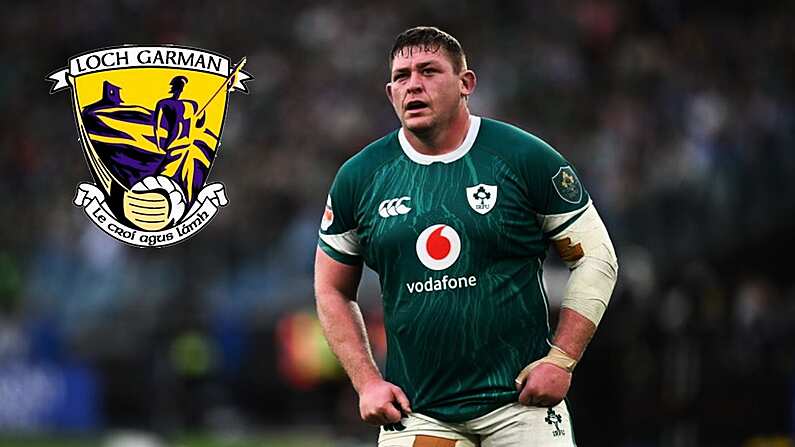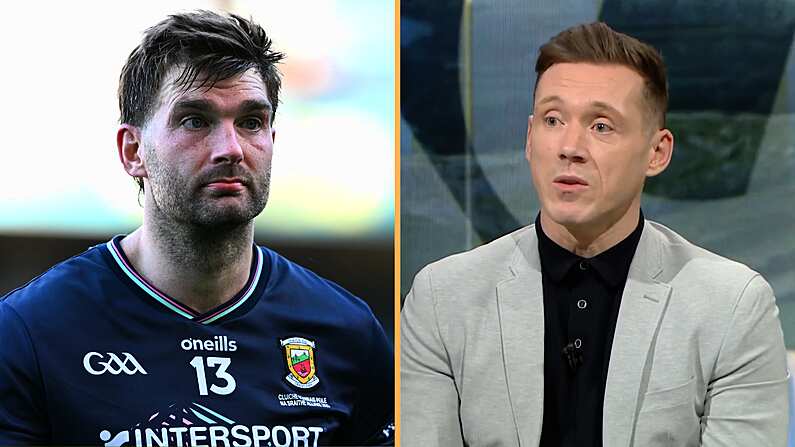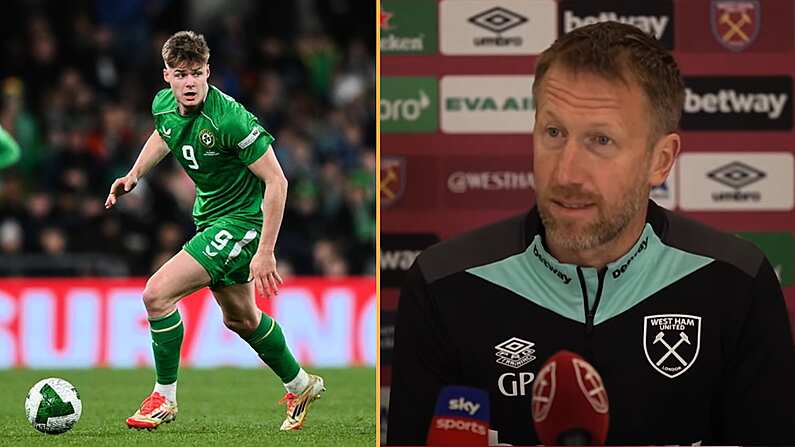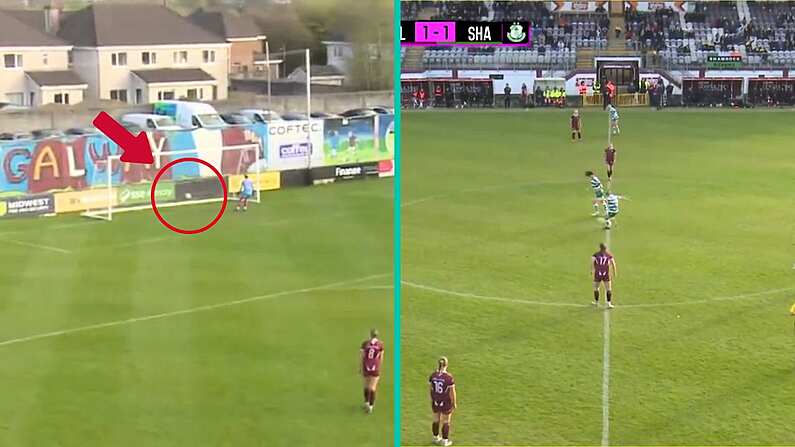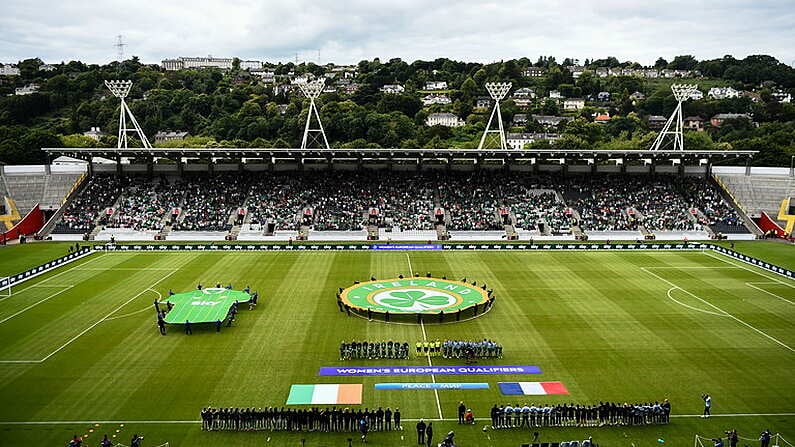Picture credit: David Maher/SPORTSFILE
Originally published in the Independent (UK) on February 19, 1995
AFTER the English hooligans shamed their country at Lansdowne Road last Wednesday evening, anger was not the prevailing emotion. Those among the 46,000 crowd unfamiliar with the nature of English football were in shock, their feelings most eloquently expressed on the face of a small Irish boy whose hurt and bemusement was frozen on a television image transmitted around the world the following day.
Like many another Irish father, Seamus Eager had pulled every string available to get the precious tickets to take his lad James to this game. It seems important to explain - especially to those with power and influence in English football - exactly why James looked forward so much to this occasion. James is seven years old, a Manchester United fan. Of course he is an Irish fan as well, and the prospect of seeing Jack Charlton's Republic of Ireland team must have made him a happy boy as he fell asleep on Tuesday night.
But for small Irish boys, and for many who are older and no longer dreaming, English football is magic and, win or lose, Wednesday was to be a very special night. Shearer, Beardsley, Ince, Le Tissier, Platt and Anderton were coming to our city, to a town that loves English football, its great players and clubs, as if they were our own. Whatever the politicians and other advocates of Irish nationalism told us to the contrary, about cruel England and the imperatives of history, we knew different.
We were acquainted with another England, for we knew about Tom Finney, Stanley Matthews, Bobby Charlton and Bobby Moore. We knew about English grace and decency for we had seen their football teams play: Manchester United, Spurs, Danny Blanchflower's glorious double team, the Liverpool of Dalglish and Keegan. The combined efforts of the British Paratroop Regiment, the Irish Republican Army and implacable native historians could not persuade us that our devotion to English football was some kind of heresy. We knew something else as well: that when our best footballers went to live and work in England they enjoyed parity of esteem in a fair and pleasant land.
This week's invasion may alter our perspective, crystallising as it has for many of us who are aware of what is good, uniquely so, in the English character, an uneasy feeling that ultimately our affection has been misplaced. We have, in the words of the Irish poet Patrick Kavanagh lamenting a lost love:
Loved not as I should
a creature made of clay
When the angel woos
the clay he'll lose
his wings at the dawn of day
In James Eager's face, we saw that look of love betrayed.
SADLY, more experienced observers of Wednesday's ugly theatre were not surprised by the scenes we witnessed. For two decades at least we have known that behind the glamorous faade, English soccer is rotten to the core, providing a fertile environment for spivs, racists, and violent fantasists, administered in the main by the type of person John Betjeman identified as:
That man with double chin
who'll always cheat and always win
who washes his repulsive skin
in women's tears
Too many of the gentlemen who define the values that obtain in James Eager's beloved illusion conform to that description. Last Wednesday, as the fans streamed sadly from the stadium, leaving behind the scum, caged yet in command of our game, a pall of despair descended on Lansdowne Road as the inquest began. English journalists wandered around, muttering abjectly of their shame.
These men are veterans, not fond of platitudes, nor given to idle expressions of regret. Their despair was genuine, poignantly so. They wondered aloud what had become of their game, even more profoundly what has happened to their country. When Graham Kelly, the Football Association's Chief Executive, appeared to proffer the official line, nobody was inclined towards rigorous interrogation. The problem is bigger than this decent football fan.
Listening to Kelly field questions - all of them echoes of so many other nights of shame - I recalled some lines from "Slough", the Betjeman poem quoted above:
But spare the bald young clerks who add
the profits of the stinking cad
It's not their fault that they are mad,
they've tasted Hell.
It's not their fault they do not know
the birdsong from the radio
It's not their fault they often go
To Maidenhead
And talk of sports and makes of cars
In various bogus Tudor bars
And daren't look up and see the stars
But belch instead.
Come friendly bombs and fall on Slough
It isn't fit for humans now.
For Slough, read English football, which is no longer the game of Tom Finney or Bobby Charlton or indeed Alan Shearer, the greatest of contemporary players. The single most potent symbol of English soccer today is Eric Cantona whose malevolent spirit haunted many souls in Dublin last Wednesday night. What an inspiration Cantona must be for those young men, alienated to the point of derangement, who vented their fascist rage on the innocents around them.
Cantona is not, of course, alone in his disgrace. But his case is the most instructive as to the nature of English football today. His club, Manchester United, have stood by him. Bobby Charlton is, ironically, a director. Still. After the incident at Selhurst Park last month, the Bic Razor company filmed a new commercial featuring this irredeemable blackguard. Before his most recent offence, the sportswear company Nike distributed an advertising video on which Cantona boasts about spitting at fans and kicking opponents. Banished from France, Eric Cantona has in England become a cult hero, marketing thuggish behaviour with impunity.
When he assaulted an ITN reporter last week Cantona was pardoned by Alex Ferguson and the President of the Football Association, Sir Bert Millichip, who argued that the incident was "unrelated to football". In which case football must be unrelated to life. The truth is that Sir Bert and other apologists for Cantona are unrelated to reality. And will remain so detached, the events in Dublin last week notwithstanding.
Urging reality on the clerks who administer English football has long been futile. They feel themselves to be, and are, largely, helpless as the waves of violence, racism and corruption, the prevailing values of contemporary English society, engulf their sport. This nation has lost its identity, dark forces have been unleashed, most visibly on Saturday afternoons when the masses come out to play.
English football's crime is not to be the source of evil frustration rather to offer a home to those who rage and hate, those who wish to be known as Thatcher's Children, the greedy, ostentatious, new merchant class, unloved, unlovable, uncouth, claiming the best seats in the house.
Yes, it is true, as Graham Kelly argued last week, that football cannot be held responsible for the endemic yobbishness of England post-Thatcher. That is not, alas, the indictment. What one can see, what is so clear, and sadly unacknowledged when men like Kelly try to rationalise their troubles, is that, far from declaring loutishness repugnant to the game, English football is, in the case of Cantona, indulging the basest elements in society.
In this regard, the book of evidence is thick. John Fashanu, a footballer with a propensity for violence, is a hero in this game. Intelligent, articulate, persuasive, imitated, Fashanu is another menacing omen of our time. The BBC clearly disagree, employing Fashanu as your friendly game show host. Vinnie Jones is another role model for the men who prematurely ended last week's game. Paul Ince was wearing an England shirt in Dublin, pending further investigation of the Cantona affair. Dennis Wise was selected for the game but withdrew after being found guilty of criminal assault on a London taxi-driver. One singles out these footballers reluctantly to illustrate the tolerance within the game for behaviour unbecoming the hero. Cantona and the others named here have prospered despite their sins. An idea of what is acceptable, worse, celebrated, is abroad. As we saw on Wednesday the signals transmitted from within the game have been received by those who follow English football.
And, thus, in ever growing numbers, people who are disturbed, by racist grievance, or violent fetish, populate the great stadiums of England, the hitherto sacred cathedrals of popular culture, giving blasphemous expression to the poison in the darker recesses of England's soul.
When Manchester United play Liverpool, two malicious mobs congregate. At one end, the Liverpool crowd chant vicious doggerel about the bodies of the Busby Babes being scraped off the ice on that Munich runway after the tragic crash of February 1958. The response from Manchester's finest reminds the enemy of the Hillsborough tragedy in 1989 when 91 Liverpool fans perished on a day we can never forget. This disgusting theatre, throbbing with hate, exposes a truth about England we are loath to reflect upon.
There are other revealing images associated now with the game that once, long ago, was known for Bobby Charlton: the corrupt yet unconvicted managers; the brazen spivs called agents; the banal conspirators in this story, the hacks of print journalism and television commentary who bray about the "good things in the game" when turning blind eyes to the decadence evidently infesting the sport of Association Football. Where once we raged against the dying of the light, we are now resigned, bewildered like young James, consoled, as he cannot be, for having known Charlton, Best, and Bobby Moore. We wooed English angels. He must make do with English clay.
Come, friendly bombs, and fall on Slough
It isn't fit for humans now
There isn't grass to graze a cow
Swarm over, Death!



